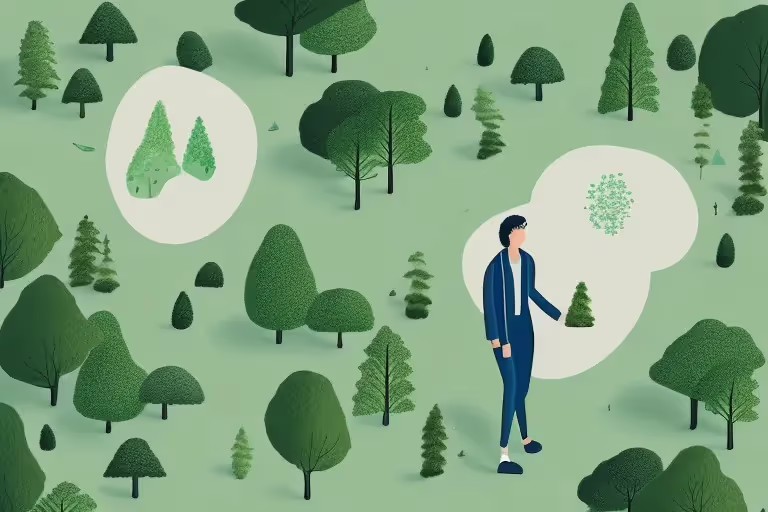Walking meditation is a practice that has been used for centuries to connect with nature and cultivate mindfulness. It involves walking in a slow and intentional manner, while focusing on the present moment. This practice has numerous benefits, from improving physical health to reducing stress and anxiety. In this article, we will explore the world of walking meditation and provide a step-by-step guide on how to start your own practice.
The Benefits of Walking Meditation
Physical Health Advantages
Walking meditation is an excellent form of exercise and has numerous physical health benefits. It can improve your cardiovascular fitness, strengthen your muscles and bones, and decrease your risk of chronic diseases such as heart disease and diabetes. Walking meditation is a low-impact exercise that is easy on the joints, making it an accessible form of exercise for people of all ages and fitness levels. Additionally, walking meditation can be done anywhere, making it a convenient way to stay active and healthy.
Regular walking meditation can also aid in weight loss. According to the American Council on Exercise, walking at a moderate pace can burn up to 300 calories per hour. This means that incorporating walking meditation into your daily routine can help you achieve your weight loss goals.
Mental Health Improvements
Walking meditation is an effective tool for improving mental health. It can reduce stress and anxiety, boost your mood, and improve your ability to concentrate. Walking meditation allows you to focus on the present moment and let go of worries about the past and future. This can lead to a sense of calm and relaxation.
Studies have shown that walking meditation can also improve sleep quality. The National Sleep Foundation recommends that adults get at least 7-9 hours of sleep per night. However, many people struggle with insomnia or poor sleep quality. Walking meditation can help improve sleep by reducing stress and anxiety, which are common causes of sleep problems.
Spiritual Growth and Connection
Walking meditation is an excellent way to connect with nature and explore your spirituality. It allows you to tune in to your inner self and connect with the world around you. Walking meditation can deepen your sense of purpose and increase your feelings of gratitude and connection.
Many people find that walking meditation helps them feel more connected to their surroundings. It can help you appreciate the beauty of nature and feel a sense of awe and wonder. This can lead to a greater sense of spirituality and connection to something greater than yourself.
In conclusion, walking meditation has numerous physical, mental, and spiritual benefits. It is an accessible and convenient form of exercise that can improve your overall quality of life. Whether you are looking to improve your physical health, reduce stress and anxiety, or deepen your spiritual connection, walking meditation is a great place to start.
Understanding the Basics of Walking Meditation
Walking meditation is a practice that has been around for thousands of years and has its roots in Buddhism. It is a form of meditation that involves walking slowly and mindfully while focusing on your breath and body. This practice is designed to cultivate mindfulness, reduce stress, and increase overall well-being.
The Origins and Philosophy
The philosophy behind walking meditation is to cultivate mindfulness by staying in the present moment and focusing on your breath and body. This practice is based on the Buddhist concept of mindfulness, which involves paying attention to the present moment without judgment. Walking meditation is a way to integrate mindfulness into your daily life, allowing you to stay present and focused in everything you do.
Walking meditation has been practiced for thousands of years and has been passed down through generations. It is often practiced in monasteries and meditation centers, but it can also be practiced at home or in nature.
Key Components of Walking Meditation
The key components of walking meditation are intention, awareness, attention, and acceptance. Setting your intention is essential in walking meditation to create a sense of purpose and focus. This involves setting an intention for your practice, such as cultivating compassion or reducing stress.
Awareness involves paying attention to your surroundings and your body. This includes noticing the sensations in your feet as they touch the ground, the movement of your body as you walk, and the sounds and smells around you.
Attention is the act of focusing your mind on your breath, body, and surroundings. This involves bringing your attention back to the present moment whenever your mind begins to wander. It can be helpful to count your breaths or repeat a mantra to help focus your mind.
Acceptance involves accepting whatever thoughts or emotions arise without judgment. This means allowing yourself to experience whatever comes up during your practice, whether it is joy, sadness, or frustration. By accepting your thoughts and emotions, you can learn to let go of them and cultivate a sense of inner peace.
Different Types of Walking Meditation
There are several different types of walking meditation, each with its unique benefits. Traditional walking meditation involves walking slowly and mindfully in a quiet space, such as a meditation hall or garden.
Walking outdoors is another form of walking meditation that can be practiced in nature. This practice allows you to connect with the natural world and can be especially beneficial for reducing stress and anxiety.
Labyrinth walking meditation involves walking a labyrinth, which is a circular path that leads to the center. This practice is often used for spiritual or religious purposes and can be a powerful way to connect with your inner self.
Overall, walking meditation is a powerful practice that can help you cultivate mindfulness, reduce stress, and increase overall well-being. By incorporating this practice into your daily life, you can learn to stay present and focused in everything you do.
Preparing for Your Walking Meditation
Walking meditation is a form of meditation that involves being mindful while walking. It is a great way to cultivate mindfulness and reduce stress. Here are some tips to help you prepare for your walking meditation practice.
Choosing the Right Location
Choosing the right location for your walking meditation is essential. Look for a quiet and peaceful place where you feel safe and comfortable. A natural setting, such as a park or beach, is an ideal location. The fresh air, natural surroundings and sounds of nature can help you to relax and connect with the present moment.
If you are unable to find a natural setting, you can also choose a quiet and peaceful indoor location, such as a yoga studio or a quiet room in your house. Just make sure that the space is free from distractions and interruptions.
Setting Your Intention
Setting your intention for your walking meditation is essential. Reflect on your purpose for practicing and set an intention that aligns with your goals. This can provide a sense of direction and focus for your practice.
Your intention could be as simple as wanting to be more present in your daily life or as specific as wanting to cultivate more compassion towards yourself and others. Whatever your intention, take some time to reflect on it before you begin your practice.
Dressing Comfortably and Appropriately
Dressing comfortably and appropriately is important for your comfort and safety. Wear comfortable clothing and shoes that allow for ease of movement and support. Avoid wearing tight or restrictive clothing that may limit your movement or cause discomfort.
You may also want to consider the weather conditions and dress accordingly. If it is hot outside, wear light and breathable clothing, and if it is cold, dress in layers to stay warm.
By following these tips, you can create a safe and comfortable environment for your walking meditation practice. Remember to be patient and gentle with yourself as you begin your practice, and allow yourself to fully experience the present moment.
Step-by-Step Guide to Walking Meditation
Establishing a Mindful Pace
Start by standing still and taking a few deep breaths, allowing yourself to become centered. Begin walking at a slow and steady pace. Focus on the sensations of your feet touching the ground, the movement of your body, and your breath.
Focusing on Your Breath
Pay attention to your breath as you walk. Inhale deeply and exhale slowly. Notice the sensations of your breath in your body. Center your mind on your breath and your movement.
Engaging Your Senses
Engage your senses as you walk. Pay attention to the sounds, smells, and sights around you. Take time to notice the details of your surroundings. Allow yourself to fully engage with your environment.
Practicing Mindful Awareness
As you continue to walk, bring your attention back to your body and your breath. Observe any thoughts or feelings that arise, acknowledge them, and then let them go. Cultivate a sense of mindfulness and awareness of the present moment.
Walking meditation is a powerful tool for connecting with nature and yourself. With practice, this ancient practice can bring profound physical, mental, and spiritual benefits into your life. Start with small steps, find your intention, and enjoy the journey to mindfulness and self-discovery.



.webp)






.avif)

%20(1).avif)


.avif)
.avif)
.webp)


.avif)


















































































































.avif)

















.svg)









